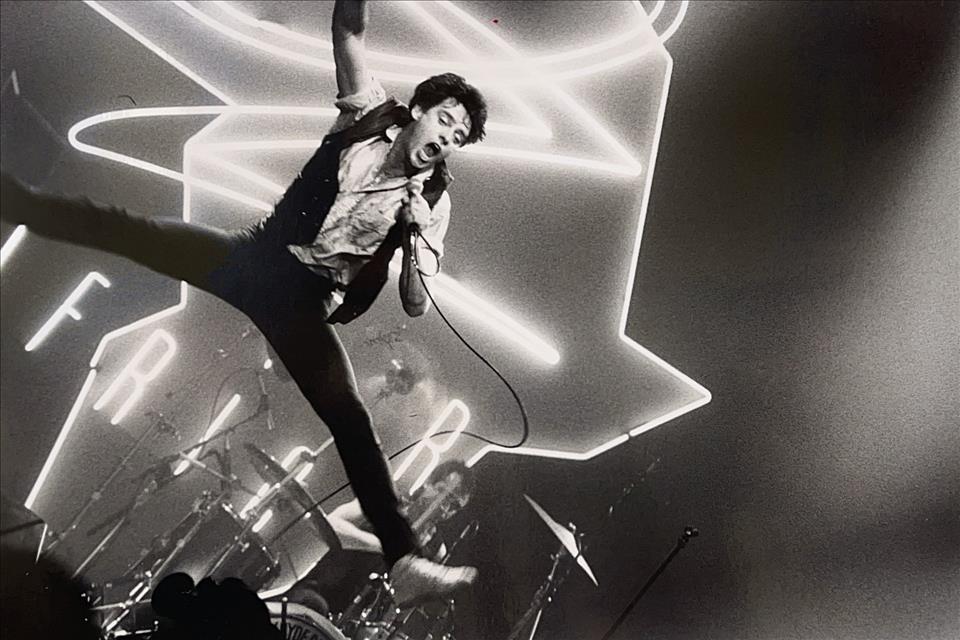(MENAFN- The Conversation) When I was a kid, my dad Max took me to basketball games at Melbourne's Entertainment Centre. I'd wait in my plastic bucket chair as the cheerleaders shook their pom poms and the teams did lay ups. The music was loud, and around the time everyone had found their seats, one song would often come on.
It opened with a wailing, single note guitar, followed by a chunky, palm muted riff, driving along until bursting into the chorus when the vocals would demand“Am I ever gonna see your face again?” And as I licked my lemonade icy pole I'd delight as the whole stadium would chant back“No way, get fucked, fuck off.”
I had no idea the band was called The Angels. I didn't know they were supposed to be the next AC/DC but didn't quite“make it”. The intense relationships at their core were lost on me. I was just delighted by how wild it felt, this song the audience owned, breaking rules, answering back.
A new documentary, Kickin' Down the Door chronicles Australian band The Angels across four decades, from suburban Adelaide to the gloss of albert studios and beyond.
The classic Oz rock vibe is omnipresent: dudes, riffs, volume.
But this story's star quality is how hard it works to showcase the band from both front of house and backstage, offering something far more nuanced than the well-thumbed tale of these national music icons.
Finding intensity
The documentary centres on the songwriting team of the Brewster brothers, vocalist Bernard“Doc” Neeson, and a revolving cast of drummers, bass players and producers.
The themes are what you might like in a documentary about Australian rock 'n' roll: journeys to adulthood, mateship, resistance, lashings of hope, dollops of luck. Interviews from the band and their nearest and dearest sidle up against archival footage with cute animations bridging scenes.
There's the ubiquitous drop-in from a couple of international names to provide cred – thankfully a Bono-free endeavour. There's a slither of pre-hat Molly Meldrum. The eye candy of 70s and 80s Aussie life abounds.
The film uses archival footage and contemporary interviews. Maslow Entertainment The songs are central to Kickin' Down the Door, but rock 'n' roll has always been about theatre, and front man Doc Neeson's lead in creating an unsettling intensity at live shows lifted The Angels beyond the meat and potatoes of standard Oz rock.
In one scene, the lighting guy talks about how Doc used silence and darkness as a tool of intensity – the antithesis of rock show bombast.
Read more: gibson guitars: sound of rock that will never go out of fashion
A complex portrait
Like The Angels did with rock 'n' roll, Kickin' Down the Door offers a key change in the way it positions the people behind the scenes. Director Madeleine Parry has brought together a complex web of relationships pivoting on creative jubilation, obligation, devotion and estrangement.
At an early gig, the Brewsters' mother is recalled as dancing on a table in a“sea of blokes”. These were her boys, who could do no wrong.
Mothers, girlfriends, wives and children are elevated close to the story's centre, anchored within the nostalgic rhythm of white suburban Australian life to contrast with the band's sprint – then marathon – to rock 'n' roll stardom. Beyond the band bubble, everyone's sacrifice is apparent.
It's not just about the band – it's also about the people around the band. Maslow Entertainment “We all supplied the stability while they chased the dream,” says Neeson's then partner.
In bringing women to the front, Parry frames the main players as multi-dimensional, emotional and expressive. The intensity of volume, riffage and flamboyance sits in dialogue with each band members' reflections to present the way that“performance” seamlessly slides across gender and genre.
This deep thoughtfulness shines through the dizzying foray of complex legal and financial arrangements bands can be thrown into, setting them up with lifelong debt.
This is the persistent myth of“luck” in rock 'n' roll. This myth grinds against the power imbalance inherent in an incredibly competitive, brutal and sometimes hedonistic global business culture. For decades, rock 'n' roll has relied on the exploitation of artists who sacrifice family, health, economic security and friendships to have sustainable careers.
The film skilfully looks at the dark side of rock 'n' roll. Maslow Entertainment This documentary skilfully weaves the devastation that comes when these pressures evaporate years of work for bands and their teams.
It isn't so much a story about the big bad music industry swallowing up another Australian wanna be. Rather, it is a well-crafted assemblage of the pervasive way rock 'n' roll's mystique works behind the scenes, prioritising profits over health and wellbeing, and the sustainability of artists and their families.
Read more: why artistic differences in a band can be a good thing
The sonic legacy
Undoubtedly the biggest names now in Australian guitar driven music – Amyl and the Sniffers, Courtney Barnett, King Gizzard & the Lizard Wizard, Tame Impala – are part of the sonic legacy of bands like The Angels.
But they also show a marked shift in how they do business when courting international markets, maintaining elements of independence and control that The Angels had no blueprint for.
This current crop of bands also show we are on the road to far better gender representation of what contemporary rock music looks and sounds like. And in other genres, artists like Baker Boy, Genesis Owusu, Barkaa and Jaguar Jonze continue to contest and take ownership of“the sound” of Australian music.
Incidentally, I never went on to play basketball. I picked up an electric guitar instead.
The Angels: Kickin' Down the Door is in Australian cinemas from today.




















Comments
No comment